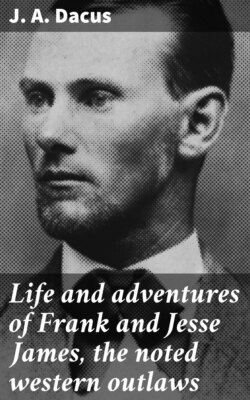Читать книгу Life and adventures of Frank and Jesse James, the noted western outlaws - J. A. Dacus - Страница 13
На сайте Литреса книга снята с продажи.
CHAPTER XI.
IN THE HANDS OF FRIENDS.
ОглавлениеTable of Contents
Jesse James, soon after the night attack before related, proceeded to Kentucky, where Frank was stopping with friends. He had not recovered from the effects of the terrible wounds which he had received in the breast just after the close of the war. Frank was still unable to ride abroad on account of the bullet wound in his hip received on the day of the Brandenburg tragedy. In the early part of the summer of 1867, Jesse arrived at the house of a friend in Nelson county, Kentucky, near the town of Chaplin. Frank was already there. In this neighborhood dwelt a large number of people who were either related to them or devoted admirers of the noted Guerrillas. They had been the friends and entertainers of Quantrell, Marion, Sue Mundy, and others of the Guerrillas in the closing days of the war.
Soon after his arrival in Chaplin, Jesse, whose condition seemed to grow worse instead of better, concluded to place himself under the surgical care of Dr. Paul F. Eve, of Nashville, Tenn. He proceeded to Nashville, where he remained for several months, and received much benefit to his health.
In the beginning of the year 1868 Jesse and Frank were once more re-united at the house of a relative at Chaplin. From all that can be learned, the life led by the wounded desperadoes while with their Kentucky friends was as pleasant as could be expected under the circumstances. There was a large community of people in that section who were intensely Southern in feeling, and mourned the defeat of the cause for which so many noble lives had been sacrificed, with an intense grief. Every one who had fought for that cause was dear to them, and when the Missouri youths came to the homes of the Samuels, and McClaskeys, and Russels, and Thomases, and Sayers, they were sure to receive a warm welcome.
In that part of Kentucky there were scattered about many of the adventurous partisans who had followed Sue Mundy, Magruder, Marion and other Guerrilla chiefs in the days of the war. With some of these Frank James had served in the closing days of Quantrell's career.
The Jameses were feted and feasted by the hospitable Kentuckians, and so tenderly nursed that their wounds had very much improved. Logan county was also the home of many of their friends, and numerous relatives of the boys, and between these and those residing in Nelson county, they passed to and fro at will, and wherever they might happen to rest, they were honored guests of families who possessed the pecuniary means to enable them to be hospitable. Fair ladies smiled on them, and gentle hands were ready to serve them in the hour of pain. It seems that they should have been happy, or at least contented.
But the James boys' career had been stormy; they had an active, restless disposition; they had lost the delicate sensibilities of well organized members of society, and the rough experiences through which they had passed had evidently destroyed, in a measure, whatever of human sympathy had belonged to their nature.
And yet at this time their friends—and they had many—believed them to be honorable and honest, if desperate in conflict. They knew that they had killed many men, but this was excused, because the men killed were enemies, and the killing was done in combats. So it came about that these most noted of outlaws for many years had friends who believed in their integrity, and were ready at all times to engage in the defense of their character.
The times were favorable. There were many desperate young men turned adrift by the events of the war; men ready to engage in any undertaking which promised excitement and gain. Over such, Jesse and Frank James could exercise a large influence, and from among such they drew allies in the commission of crime.
The individual members of organizations which had hovered along the borders, and hung on the verge of the great field of warfare, in character one half soldier and the other half bandit, were just the kind of men from whose ranks recruits for lawless enterprises could be enlisted. In Kentucky and Tennessee, Arkansas and Missouri, there were many such persons—men who, during the great strife, when mighty hosts clashed against each other, and tremendous events were taking place, had occupied an anomalous position which brought upon them the hate of the Federals, and incurred for them the displeasure of the Confederates, were in a position where a step further could not materially alter their relations to society. The men who had fought with regiments, banded in great armies, whether on the side of the Federals or Confederates, did not look with any great consideration on those who had lingered along the borders of war, as independent companies of scouts and Guerrillas.
There were many men in Kentucky at the time of which we speak who had been in organizations of the character above described—that is, Guerrilla bands, both Federal and Confederate. The regular soldiers of both armies, whose families had suffered in consequence of the partisan warfare, looked with ill-concealed dislike upon the free riders of the border, and this fact, no doubt, had a large influence in driving many of the Guerrillas into downright outlawry when the war had closed. It was in a community of ex-Guerrillas that Frank and Jesse found themselves in Kentucky, and among such "friends," no doubt, their first great project of bank robbing had its inception and complete maturity.
